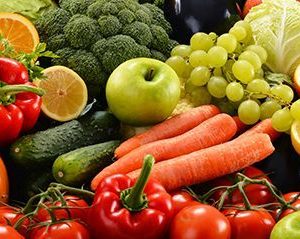- Recognizing the Signs of Hypothyroidism
- 10 Strategies to Overcome Insomnia
- Could Artificial Sweeteners Be Aging the Brain Faster?
- Techniques for Soothing Your Nervous System
- Does the Water in Your House Smell Funny? Here’s Why
- Can a Daily Dose of Apple Cider Vinegar Actually Aid Weight Loss?
- 6 Health Beverages That Can Actually Spike Your Blood Sugar
- Treatment Options for Social Anxiety Disorder
- Understanding the Connection Between Anxiety and Depression
- How Daily Prunes Can Influence Cholesterol and Inflammation
The 5 Foods That Cut Your Odds for Colon Cancer

When it comes to guarding against colon cancer, what you eat is everything.
You can reduce your risk of colon cancer by eating five food types, an expert says. These include: vegetables; whole grains; legumes; nuts and seeds; and fiber-rich fruit.
“Vegetables contain cancer-preventing nutrients called carotenoids and flavonoids,” said Amy Rosenfeld, program coordinator of community health, education and outreach and a registered dietitian at the Center for Healthy Living at Northern Westchester Hospital, in Mount Kisco, N.Y.
“Vegetables are high in fiber, bulking your stool and limiting the amount of time waste spends in your colon, reducing your risk for colorectal cancers,” she added.
At every meal, you should try to cover half your plate with colorful vegetables, and that can include frozen vegetables, which are affordable and ready-to-eat, Rosenfeld said.
Whole grain foods have high levels of fiber. When shopping for bread and cereal products, select those that list whole grain ingredients first.
“Try replacing white grains — like white rice — with whole grains or mixing the two together. Eating three servings, or about three ounces of whole grains a day, will not only increase fiber, but also B vitamins and important minerals, such as iron, zinc, copper and magnesium,” Rosenfeld said.
Examples of whole grain products include whole wheat bread, barley, oats, quinoa, buckwheat, corn, brown rice and wild rice.
Legumes have lots of fiber and help keep your digestive tract healthy. “By regularly eating beans and lentils, you lower your risk for cancerous colon polyps (small growths),” Rosenfeld said. “Try substituting beans or lentils for meat twice a week or reducing meat in your recipes and add in legumes.”
Put navy beans, chickpeas, fava beans, kidney beans, lentils, lima beans, black beans and cannellini beans on your grocery list, she suggested.
The next category is nuts and seeds, which “are the perfect foods,” according to Rosenfeld. “Their fiber, healthy fat, phytochemicals, and antioxidants all have cancer-fighting properties. Try snacking on nuts or seeds instead of chips or pretzels. Natural nut and seed butters make a great dip for your favorite fruit. Mix in ground flax seeds or chia seeds into oatmeal.”
It’s also important include fresh or frozen fiber-rich fruit in your diet, she said in a hospital news release.
“Eat the rainbow when it comes to fruits,” Rosenfeld recommended. “Try to eat one to two cups of fruit each day and mix up the colors. Each color fruit has a unique combination of nutrients with cancer-fighting properties. Fruit also has fiber, vitamins and minerals, and its natural sweetness helps you resist refined sugary treats without nutritional benefits.”
More information
The U.S. National Cancer Institute has more on colorectal cancer prevention.
SOURCE: Northern Westchester Hospital, news release, March 23, 2021
Source: HealthDay
Copyright © 2026 HealthDay. All rights reserved.










